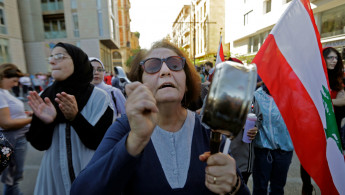Lebanon: Gebran Bassil's supporters claim he's victim of 'Zionist conspiracy' over Davos controversy
A pro-government Lebanese politician has claimed a petition against much loathed foreign minister Gebran Bassil for representing Lebanon at the World Economic Forum in Davos is an "Israeli Zionist conspiracy".
May Khreich, deputy leader of Bassil's Free Patriotic Movement (FPM) founded by Bassil's father-in-law, President Michel Aoun, said people opposed to the foreign minister's presence at Davos are playing into the hands of Israel - a country Lebanon has no official ties with.
"I believe there is a Zionist campaign against Bassil's participation in the conference, and all those in Lebanon calling against his attendance are directly or directly part of the Zionist campaign," she said in a phone call with local TV Al-Jadeed.
"Minister Bassil decides alone whether to participate at the Davos conference, but we denounce the suspicious campaign against his participation. He has popular legitimacy and he is fulfilling his duties," she added.
The bizarre allegations are rooted in pro-FPM social media accounts sharing old images of CNBC's Hadley Gamble, who will moderate the panel, with Israeli late President Shimon Peres as "evidence" of the conspiracy.
|
||
Gamble has responded to the national fury by pledging to hold Bassil to account.
"There's been a lot of concern in the last 24-hours from our Lebanese viewers about whether or not this gentleman should be on a panel, considering he's part of the caretaker government," she said Monday evening.
"As a journalist, as someone who holds Lebanon very close to my heart, I have many people there I consider to be members of my own family... we are going to hold Gebran Bassil very much to account to what is happening in Lebanon," she added.
Hela hela hela ho
The petition was launched on Monday and within hours of going online prompted tens of thousands of Lebanese to sign it.
Lebanese activists feel that Bassil's role as a minister amid a crackdown on anti-government protests, means that he should not be given a platform to speak on human rights issues.
"Since 17 October 2019 and as of date for close to 96 days the Lebanese people have taken to the streets en masse to protest against political corruption, high-unemployment, austerity, sectarianism and a deepening recession among other basic human rights such as lack of stable running water and 24-hour electricity, a crisis the country have experienced for close to 30 years," the petition said.
The petition stated that Bassil "has been at the centre of all major disastrous decisions that led the country to a political crisis that is likely to bankrupt the country in the not too distant future".
Read more: Why Gebran Bassil is the most reviled politician in Lebanon today
"He has also been linked to squandering of billions of dollars of public funds, money laundering, illicit enrichment of his family members among other ill-fated judgments," the petition claimed.
At the start of the Lebanese uprising, Bassil, who is the son-in-law of President Michel Aoun and leader of the Free Patriotic Movement party, was subject to a popular protest chant "hela hela ho Gebran Bassil… k*** emmo", deemed as an insult aimed at the foreign minister and his mother.
Economic crisis
Lebanon's protest movement is in part fuelled by the worst economic crisis that Lebanon has witnessed since the 1975-1990 civil war.
The demonstrators have been denouncing rampant corruption in Lebanon and accuse authorities of being inefficient and motivated by personal and partisan gains.
The protests have been met with violence as state security apparatus using disproportionate levels of force against them.
On Saturday alone, 400 people were injured in a violent police crackdown.
The protests this week saw angry demonstrators attack banks following the imposition of sharp curbs on cash withdrawals to stem a liquidity crisis.
Over the past few months, the Lebanese pound - long pegged to the US dollar at 1,507 - has fallen in value on the unofficial market to around 2,500.
The World Bank has warned that the poverty rate in Lebanon could rise from a third to a half of the population if the political crisis is not soon remedied.
Follow us on Twitter and Instagram to stay connected





 Follow the Middle East's top stories in English at The New Arab on Google News
Follow the Middle East's top stories in English at The New Arab on Google News
![Netanyahu furiously denounced the ICC [Getty]](/sites/default/files/styles/image_330x185/public/2024-11/GettyImages-2169352575.jpg?h=199d8c1f&itok=-vRiruf5)
![Both Hamas and the Palestinian Authority welcomed the ICC arrest warrants [Getty]](/sites/default/files/styles/image_330x185/public/2024-11/GettyImages-2178351173.jpg?h=199d8c1f&itok=TV858iVg)
